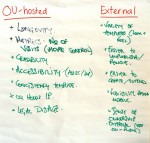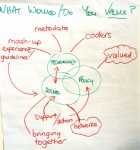
Last week (12th May), Ann Grand and I gave a seminar at the OU on Digital Engagement. I started by giving a brief introduction to public engagement, referring to the NCCPE's EDGE tool for self-assessment, and a description of the purpose of the OU's Public Engagement with Research Catalyst project.
Ann then discussed some survey and interview studies she and Anne Adams have carried out as part of the Catalyst project. The survey work involved some additional institutional questions in the Vitae national survey of research staff (CROS) and research leaders (PIRLS). These questions explored OU researchers' understanding of and approaches to public engagement. The interview study used a structured sample of OU research projects to look at researchers' use of digital tools in public engagement.
Following Ann, I explained the findings of some work I've been doing to identify the range of digital tools available for researchers at the OU, and the process of setting up websites and blogs for researchers and research projects.
During the discussion, the seminar participants were asked to identify the benefits and challenges concerned with the use of university and externally hosted blog services. University services were perceived to have longevity, credibility, accessibility, consistency and support for visitor metrics (i.e. analytics). External services were considered to provide a wider variety of templates, to be easier to create and extend, more flexible regarding the removal of content, to provide better support for mobile devices, and to benefit from neutrality for shared (public) sites. One of the conclusions from the discussion was that researchers need -- and value having -- a range of options to meet different needs.
At this point in the Catalyst project, we want to work with researchers to identify and frame the structures that they believe will help them embed public engagement with research in their practice and in the OU's organisational culture.
So, at the end of the seminar, we invited the participants to write us a 'postcard from the edge', to tell us one thing they didn't know before the seminar, one thing we missed and one thing we should prioritise in the near future. The feedback said 'examples', 'show what works', 'evidence', 'stories' and 'case studies' ... so that's what we plan to work on next.
Here’s the video of the seminar along with the slides and abstract…
"Online practices and tools for engaging research and communication"
Slides: ou-per-seminar-20140512-online-tools-and-practices-tc-and-ag.pptx
Abstract
The OU is one of eight universities funded by the UK Research Councils to embed public engagement within the research culture of their university. Engaged research refers to the ways research can be shared with individuals and groups, beyond the immediate research community and for mutual benefit, change and/or effect. As a part of this national initiative, within the OU's 'Engaging Research' project (April 2012 to March 2015), we're exploring how OU researchers are using online tools to support their research communication and public engagement activities. We’re also working with support and service units across the university to review the institutional support for online engagement with research. In this seminar we’ll provide an overview of this work to date. We’ll discuss the findings of surveys and interviews with OU researchers concerning their perceptions of public engagement and how they use online tools within their engaged research practices. We’ll also present an overview of the tools available, and discuss the level of institutional support, responsibility and control regarding online research engagement and communication. Our overarching aim is to raise the profile of engaged research within the OU, and develop institutional support for a necessarily diverse and emerging compendium of effective practices. This seminar will provide an opportunity for you to find out more about this work and contribute to the direction it takes.



